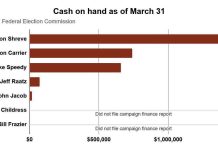A local state legislator is forging ahead with a bill that would allows fans offended by anti-patriotic displays during the performance of the national anthem, such as kneeling, to seek a refund from Indiana professional sports teams.
That comes despite previously stated opposition from his party’s leader.
House Bill 1011, authored by state Rep. Milo Smith, R-Columbus, received a first reading on the House floor Tuesday and was assigned to the House Judiciary Committee.
House Speaker Brian Bosma said last week that the proposed bill likely would die in a committee this year during the Indiana General Assembly. Prior to discussing merits of the bill with Smith, Bosma cited potential constitutional violations and possible illegal interference with private business as problems.
Since then, Smith said he has talked to Bosma, and said the House speaker didn’t tell him the bill would not be heard. Smith also said that Rep. Greg Steuerwald, R-Danville, chairman of the Judiciary Committee, told him he was considering the legislation and would notify him next week whether the bill would receive a hearing.
“It’s my intention to get a hearing on the bill,” said Smith, who is up for re-election this year in District 59.
The bill says that if a person purchases a ticket for and attends a game hosted by a professional sports team in Indiana — specifically citing teams from the National Football League, National Basketball Association and Women’s National Basketball Association — and becomes offended because a player of the host team did not stand during the national anthem, the person can seek a full ticket refund from the team.
The offended person must request in writing a refund within 30 days of the game. If the team does not refund the price of the ticket within seven days, the offended person may file within a year of the game a lawsuit in small claims court in the county where the sports event occurred, according to the bill.
If the court finds that the team didn’t provide a timely refund, the plaintiff would be awarded three times the price of the ticket, attorney’s fees, court costs and other reasonable expenses, the bill states.
The bill does not specify what “offended” means, kneeling or otherwise, or how a person might prove that they were offended.
However, Smith said he would offer an amendment to the bill, if it receives a hearing, that would clarify what “offended” means and require an offended person to request a refund during the first quarter of the game.
Smith said “offended” to him means a player taking a knee during the “Star-Spangled Banner.”
Effective date of the bill would be July 1.
“To me, it’s about showing respect,” Smith said.
The issue first gained attention in 2016 when former San Francisco 49ers quarterback Colin Kaepernick began kneeling during the “Star-Spangled Banner” as a form of protest against social injustice and police brutality. More NFL players began doing the same, and such protests continued this season.
The protests have drawn the ire of President Donald Trump, who criticized Kaepernick in late September.
Columbus native and Vice President Mike Pence attended the Oct. 8 Colts home game at Lucas Oil Stadium where former quarterback Peyton Manning was honored. Pence and his wife Karen left the game shortly after the pre-game national anthem because some of the 49ers players knelt.
Trump said on Twitter that he had instructed Pence to leave the game if any players knelt during the national anthem.
Smith previously said that his personal motivation for the bill stems from the Sept. 24 Colts game against the Browns that he attended with his family, when some members of the Colts and Browns knelt during the national anthem.
People such as military veterans, police officers and firefighters are among groups of people that Smith said deserve respect, and one way to do that is to stand during playing of the “Star-Spangled Banner.”
The legislator also said he researched the national anthem and its intention.
“The purpose of the national anthem is respect,” Smith said.
Smith’s legislation has received criticism, including from the Indiana branch of the American Civil Liberties Union. Its director, Jane Henegar, has accused Smith of attempting to use economic pressure to control the speech of private citizens, which she said is guaranteed in the U.S. Bill of Rights.
The legislator previously said he believes the bill is constitutional because of regulations some pro basketball and soccer teams have enforced with their players regarding conduct during the national anthem.
[sc:pullout-title pullout-title=”What’s next” ][sc:pullout-text-begin]
House Bill 1011 awaits a hearing in the House Judiciary Committee. If the bill would pass a committee vote, it would move to the House floor for further consideration.
[sc:pullout-text-end]




